 By ANDREW CRUMEY (Dedalus; 1995)
By ANDREW CRUMEY (Dedalus; 1995)
In this witty and concise exercise in postmodern whimsy, an eighteenth-century German prince amuses himself by conjuring imaginary cities. After several attempts he devotes the remainder of his life, and those of his subjects, to the creation of Rreinnstadt, the grandest-ever imaginary city. Among the architects of Rreinnstadt is Schenck, a cartographer who one day notices a smudged figure in an illustration of the cities’ inhabitants, a figure identified as Pfitz.
Unable to find any information about this individual, and wanting an excuse to commingle with the fetching Estrella, who’s employed as a profiler of Rreinnstadt’s inhabitants, Schenck pens a biography of Pfitz. Said bio is self-conscious and postmodern in the extreme, complete with a dialogue between the third person narrator and an unidentified other about the stylistic techniques utilized that deepens an increasingly sophisticated intermingling of illusion and reality.
As Schenck delves into the life and times of Pfitz he comes to focus on one of Rreinnstadt’s more troubling imaginary residents: Spontini, a man who went mad believing he wasn’t real. Spontini’s Estrella penned biography is anguished and fragmented in the extreme, and encompasses at least two separate viewpoints. It seems the imaginary Spontini has a troubling connection with Estrella, and a real-life murder that Spontini is being used to cover up. It’s up to Pfitz to somehow make things right through his imaginary adventures.
In contrast to most postmodern fiction, which tends to be long, boring and overly pleased with itself, PFITZ is short, snappy and quite absorbing overall, not unlike a murder mystery conceived by Borges or Pirandello. I credit the clever and ingenious Andrew Crumey, whose second novel this was (following 1994’s similarly impressive MUSIC IN A FOREIGN LANGUAGE), and also the book’s publisher Dedalus, whose overseers have an excellent eye for exotic fiction; it was Dedalus that gave us must-read mind-tuggers like Robert Irwin’s ARABIAN NIGHTMARE and Herbert Rosendorfer’s ARCHITECT OF RUINS, and I say PFITZ belongs in their auspicious company.
